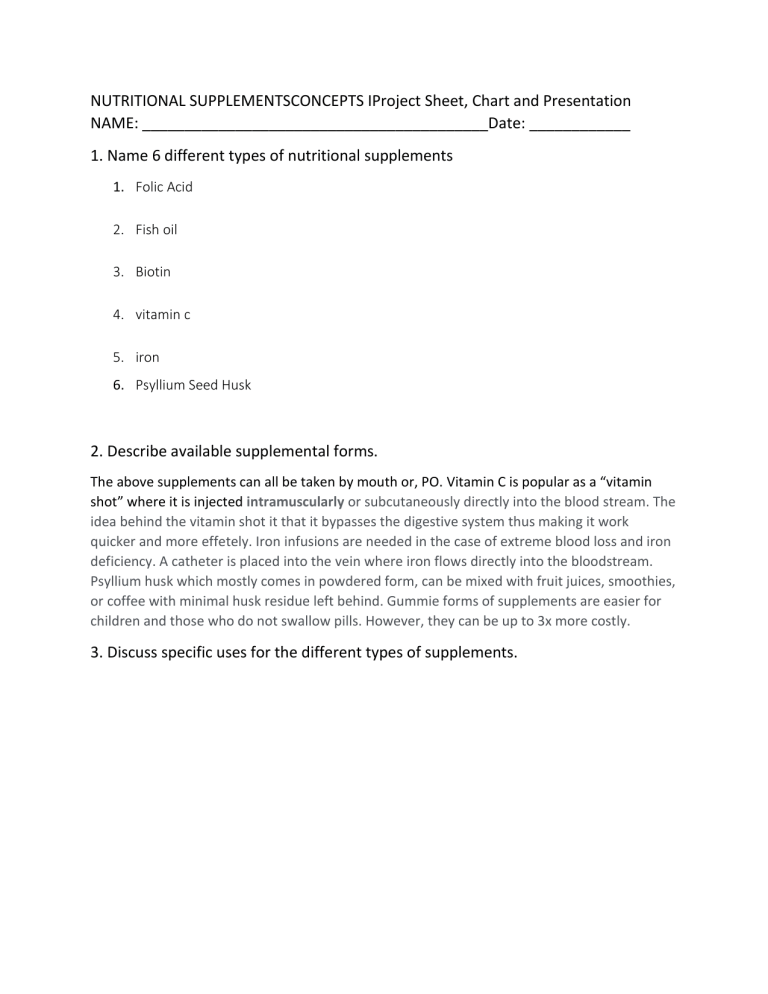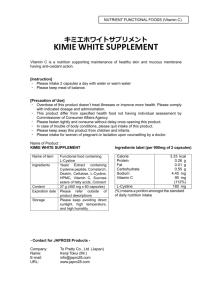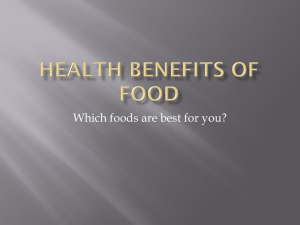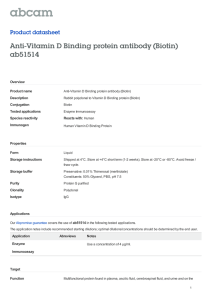
NUTRITIONAL SUPPLEMENTSCONCEPTS IProject Sheet, Chart and Presentation NAME: _________________________________________Date: ____________ 1. Name 6 different types of nutritional supplements 1. Folic Acid 2. Fish oil 3. Biotin 4. vitamin c 5. iron 6. Psyllium Seed Husk 2. Describe available supplemental forms. The above supplements can all be taken by mouth or, PO. Vitamin C is popular as a “vitamin shot” where it is injected intramuscularly or subcutaneously directly into the blood stream. The idea behind the vitamin shot it that it bypasses the digestive system thus making it work quicker and more effetely. Iron infusions are needed in the case of extreme blood loss and iron deficiency. A catheter is placed into the vein where iron flows directly into the bloodstream. Psyllium husk which mostly comes in powdered form, can be mixed with fruit juices, smoothies, or coffee with minimal husk residue left behind. Gummie forms of supplements are easier for children and those who do not swallow pills. However, they can be up to 3x more costly. 3. Discuss specific uses for the different types of supplements. 1. Folic Acid- helps produce healthy red blood cells, treats/prevents folate deficiency anemia, and helps to develop the brain, skull and spinal cord of unborn babies. 2. Fish oil- Reduces triglyceride levels, aides in weight loss and menstrual cramps, reduces risk of heart failure, and may help lower blood pressure. 3. Biotin- Biotin is used for preventing and treating biotin deficiency associated with pregnancy, long-term tube feeding, malnutrition, and rapid weight loss. It is also used orally for hair loss, brittle nails, skin rash in infants, diabetes, and mild depression. 4. Vitamin C- Vitamin C is necessary for the growth, development and repair of all body tissues. It's involved in the formation of collagen, absorption of iron, the proper functioning of the immune system, and the maintenance of cartilage, bones, and teeth. 5. Iron- Iron is a mineral that the body needs for growth and development. Iron is used to make hemoglobin and myoglobin, helps our muscles store and use oxygen, and is a needed for proper immune function. 6. Psyllium Seed Husk- Psyllium can help relieve both constipation and diarrhea, and is used to treat irritable bowel syndrome, hemorrhoids, and other intestinal problems. renal disease: Folic acid. Folic Acid reduces the risk of cardiovascular events which is increased in people with chronic kidney disease. Diabetes: Biotin. Biotin is a B vitamin needed to process glucose. High doses of biotin have been suggested to reverse some of the negative effects of chronic low insulin levels. pulmonary disease: Studies have found that high vitamin C intake improves lung function, even in cases of patients with chronic COPD. wound healing: Iron. A person is at high risk of anemia when low levels of iron are present in the body. Adding an iron supplement helps to increase red blood cells, assist in clotting and wound healing 5. Advise clients of cost and availability of above nutritional supplements Renal disease- only a small dose of folic acid is recommended to slow the progression of renal failure. It is available over the counter and with prescription at most drug stores. The average cost of a 30-day supply of 1 mg is around 12$. Diabetes- biotin is available at most grocery, health food and drugstores over the counter. Biotin is absorbed equally in any form of the supplement, but if you are looking for a lower cost, stick to biotin in tablet or capsule form. Average cost of biotin in capsule form is around $17.00 for 120 capsules. Pulmonary disease- Vitamin C dosing varies among age, weight, sex and use. The upper limit for adults both male and female is 2,000 mg /day. Vitamin c is available over the counter and by prescription. Because of its popularity in the supplement world, it can be found at almost any retail or drug store. Wound healing- iron costs around 9$ per 100 capsules, on average. Iron infusions must be prescribed by a physician, most other forms can be purchased at a drug store. 2Required Learning Activity 1. List 3 different stores and list 6 available nutritional supplements and the cost of each. Store # 1 name __GNC___ 1. Folic Acid: 100 count Capsules for $7.99. 2. Fish oil: 120 soft gels at $49.99/ Liquid form has 47 servings for $19.99 3. Biotin: 120 capsules for $24.99/ 30 soft chews for $19.99 4. vitamin c: 360 count gummies at $13.99/ 180 soft chews at $14.99 5. Iron: 100 tablets at $13.99 6. Psyllium Seed Husk: Powder: 96 servings at $24.99/ 500 capsules at $27.99 Store # 2 name : Vitamin Shoppe 1. Folic Acid: 300 capsules at $14.99 2. Fish oil: 180 soft gels at $39.99/ Liquid Form: 100 servings at $32.99 3. Biotin: 120 capsules at $19.99/ 120 gummies at $19.99 4. vitamin c: 60 count gummies at $12.99/ 100 capsules at 12.99 5. Iron: 180 tablets at $12.99/ Liquid Form: 47 servings at $19.99 6. Psyllium Seed Husk: Powder: 68 servings at $10.99/ 300 capsules at $16.99 Store # 3 name __Wal-Mart_ 1. 2. 3. 4. Folic Acid: 100 capsules at $5.25 Fish oil: 250 soft gels at $39.99/ Liquid Form: 100 servings at $42.40 Biotin: 120 capsules at $8.98/ 110 gummies at $9.46 Vitamin C: 150 ct gummies at $7.88 / 70 chewable tablets for $5.44 5. Iron: 100 tablets at $12.98/ Liquid Form: 120 servings for $25.99 6. Psyllium Husk: Powder: 38 servings at $8.88/ 500 capsules for $23.29 2. List available forms of each supplement 1. Folic Acid: Tablets, capsules, gummies, injectables 2. Fish oil: Liquid, capsules, tablets 3. Biotin: Tablets, Capsules, gummies 4. vitamin C: Chewable tablets, gummies, capsules, powders 5. Iron: Tablets, liquid, injectables 6. Psyllium Seed Husk: Powder and capsules 4. List calorie count for each supplement 1. Folic Acid: -No Calorie Count Available2. Fish oil: Liquid Form GNC, Vitamin Shoppe, and Wal-Mart: 1 teaspoon= 40 calories 3. Biotin: GNC: 1 soft chew= 20 calories Vitaminne Shoppe: 2 gummies= 60 calories Wal-Mart: 1 gummie= 10 calories 4. vitamin c: gummies: GNC:1 piuece= 5 calories Vitamin Shoppe and Wal-Mart: 2 pieces= 15 calories Chewable tablets: GNC: 1 chewable= 15 calories Wal-Mart: 1 tablet= 10 calories 5. Iron: Liquid: Vitamin Shoppe: 1 tsp= 15 calories Wal-Mart: 1 tsp= 20 calories 6. Psyllium Seed Husk: Powder: GNC: 1 tbsp= 25 calories Vitamin Shoppe: 1 tbsp= 20 calories Wal-Mart: 1 tbsp= 30 calories Capsule: GNC, Vitamin Shoppe, and Wal-Mart: 3 capsules= 5 calories 6. Design a chart depicting and comparing the above information and present to class. Create a Nursing Diagnosis/care plan : educating of patient family on 1 of your supplement chosen Include in project the potential danger of supplement interacting with prescribed medication


